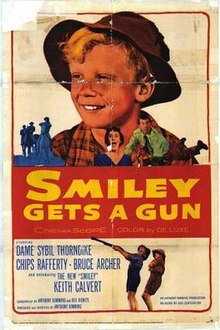Smiley Gets a Gun
| Smiley | |
|---|---|
 | |
| Directed by | Anthony Kimmins |
| Written by | Anthony Kimmins Rex Rienits |
| Based on | novel by Moore Raymond |
| Produced by | Anthony Kimmins |
| Starring | Sybil Thorndike Chips Rafferty |
| Cinematography | Edward Scaife |
| Edited by | G. Turney-Smith |
| Music by | Wilbur Sampson |
| Color process | Color by DeLuxe |
Production companies | Canberra Films London Films |
| Distributed by | Twentieth Century Fox |
Release dates |
|
Running time | 90 mins |
| Countries | Australia United Kingdom |
| Language | English |
Smiley Gets a Gun is a 1958 Australian comedy-drama film in CinemaScope directed by Anthony Kimmins and starring Sybil Thorndike and Chips Rafferty. It is the sequel to the 1956 film Smiley.
Synopsis[]
A young boy named Smiley desperately wants a gun. A deal is made between him and Sergeant Flaxman that if he gets 8 nicks (marks on a certain tree) for his good deeds he will get a .22 caliber £2 rifle. He has several adventures and is accused of stealing some gold. Smiley runs away but the real thief is caught and Smiley is rewarded with a gun.
Cast[]
- Keith Calvert as Smiley Greevins
- Alexander ( Bruce) Thomas as Smiley Greevins on horse
- Bruce Archer as Joey
- Sybil Thorndike as Granny McKinley
- Chips Rafferty as Sergeant Flaxman
- Margaret Christensen as Ma Greevins
- Reg Lye as Pa Greevins
- Grant Taylor as Stiffy
- Guy Doleman as Mr Quirk
- Leonard Thiele as Mr Scrivens
- Verena Kimmins as Miss MacCowan
- Bruce Beeby as Dr Gasper
- Ruth Cracknell as Mrs Gaspen
- John Fegan as Tom Graham
- Brian Farley as Fred
- Janice Dinnen as Jean Holt
- Barbara Eather as Elsie
- William Rees as Mr Protheroe
- Gordon Chater as Reverend Galbraith
Production[]
The novel Smiley had been so popular that author Moore Raymond followed it up with Smiley Gets a Gun in 1947.[1]
The actor who first played Smiley, Colin Petersen, had moved to England, meaning a replacement had to be found. Anthony Kimmins looked at over 4,000 other applicants before finding Keith Calvert.[2] Moore Raymond also had returned to England, writing Smiley comics for Swift Comics. Kimmins' daughter Verena who helped the young actors in the first Smiley movie had a featured role in the film.
Filming took eight weeks towards the end of 1957. Shooting took place at Camden and Pagewood Studios.[3]
Release[]
The film was less successful than its predecessor and a proposed third film, Smiley Wins the Ashes, was never made.[4]
References[]
- ^ "YOUNG AUSTRALIAN". The West Australian. Perth: National Library of Australia. 14 February 1947. p. 13 Edition: SECOND EDITION. Retrieved 31 August 2012.
- ^ "Smiley and his gun". The Australian Women's Weekly. National Library of Australia. 25 December 1957. p. 10. Retrieved 10 January 2012.
- ^ "SMILEY GETS A GUN". The Australian Women's Weekly. National Library of Australia. 3 September 1958. p. 66. Retrieved 31 August 2012.
- ^ Andrew Pike and Ross Cooper, Australian Film 1900–1977: A Guide to Feature Film Production, Melbourne: Oxford University Press, 1998 p226
External links[]
- Smiley Gets a Gun at IMDb
- Smiley Gets a Gun at Oz Movies
- 1958 films
- 1959 films
- English-language films
- Australian films
- Australian comedy films
- Australian sequel films
- British films
- British comedy films
- British sequel films
- 1958 comedy films
- Films based on Australian novels
- London Films films
- Films directed by Anthony Kimmins
- 1950s comedy film stubs